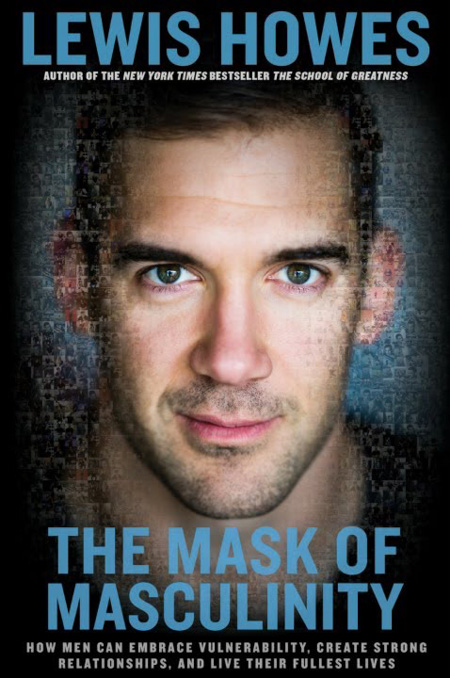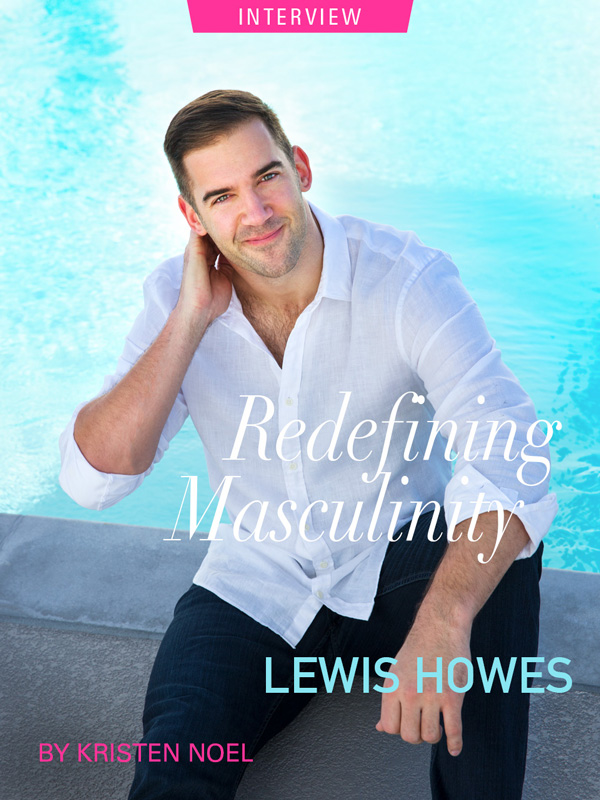
Lewis Howes
Redefining Masculinity
January 12, 2018, Los Angeles, CA
Photographs by Bill Miles
If you can’t share the things you’re most afraid of with at least one person in confidence — then that situation has power over you still. And you’re unable to be fully free until those moments in your past don’t own you anymore.
Lewis Howes
Kristen: Hey, Lewis. Thanks for inviting Best Self Magazine into your home here in sunny California (especially when the temperatures in New York are below zero!).
Lewis: Thanks for coming.
Kristen: I wanted to start by properly introducing you to our audience.
Lewis Howes is a New York Times best-selling author and lifestyle entrepreneur. He is also the man behind the mask, The Mask of Masculinity: How Men Can Embrace Vulnerability, Create Strong Relationships, and Live Their Fullest Lives. Lewis is also a rags-to-riches success story. Once a professional football player, his podcast is one of the top 100 on iTunes, he has been recognized by the White House as one of the top 100 entrepreneurs under 30, and has danced with Ellen DeGeneres on her show, just to name a few of his professional accolades. That said, while he is the master of not only setting goals, but achieving those goals —and making millions of dollars in the process — there have been times when his internal life didn’t match that of the external.
Perhaps, as they say, all roads have led to here, this space where he has bravely stepped forward to share how his own childhood wounds propelled him to spend a lifetime surviving behind protective masks. Today, he has peeled back the layers of his own masks and has a deep desire to show others how to do the same.
Lewis: That’s great.
Kristen: So, I have to tell you. I read this book, from cover to cover, and it is like music to my best self, mama-to-a-teenage-boy ears. I just want to start out by making sure that everybody understands that this is not just a book for men. This is a book for anyone who has birthed a man, loved a man, works with a man, or wants to be in a relationship with a man.
Let’s just start with WHY. Why this book, and why now? Why, at a pinnacle of your success, are you diving back into some very deep wounds?
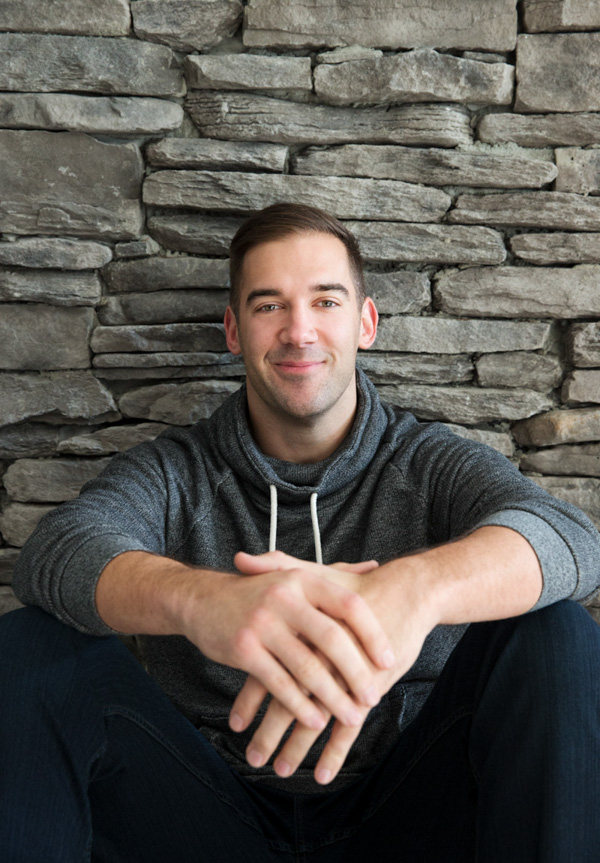
Lewis: I felt like after my last book came out my publisher and my agent were directing me towards doing an entrepreneur book or a business book, telling me this is what you the audience wants. But it just didn’t feel right for me. I was going through a transition in my life and was becoming aware of a lot of the things I’d done in my past and how it hurt me, how it affected me, and how it affected the world. I was becoming aware of it and I was talking more about that. That was the thing that was bringing me the most joy and fulfillment. I need to do this more than anything and I don’t care if it makes any money. I need to go there.
Kristen: Truth-telling.
Lewis: I don’t care how long it takes to do. It took two years of my time and energy, essentially taking me away from my business, but I was like, this is the message that needs to come out more than anything from me, because there are not a lot of tall, athletic, white, male, straight, jock-looking guys talking about this.
Kristen: …talking about their feelings, about their emotions, about their wounding, about the human experience.
Lewis: About any and all of that — and about being sexually abused.
When I was five, I was sexually abused. I talk about this in the book and I’ve been talking about it for four years now. I don’t see other examples of men that look like me who are opening up about sexual abuse and how it affected every decision of their life from that moment forward — and it’s time for that to change.
1 in 6 men have been sexually abused in their lifetime, yet you never really hear about men talking about it. 1 in 4 women have been sexually abused. It’s probably more in some arenas, but it’s even challenging for women to open up and talk about it. We’re seeing it more often, especially with the #MeToo movement — we’re seeing it every hour in the news with someone else. That said, there are not a lot of former football jocks talking about their experience and how it affected them and how it still affects them.
I felt like it was more of a duty of mine. That if I didn’t open up about this and start talking and having these conversations and researching it, that I would be doing the world a disservice — and myself a disservice.
It became a mission to create a piece of work that can support men reading it, that can support women reading it who may have fathers that were disconnected from them or who never showed them affection — to be able to understand why. I wanted to create an opportunity for others to connect and communicate — and to mend relationships with partners, and sons, and the men in their lives wearing masks.
For me, the key to success and living your best self is relationships. The key to successful relationships is vulnerability. Being able to see inside someone else and say, “I can see you. I can understand. I accept you. I acknowledge you.” Yet, we’ve lost that art of acknowledgement, compassion and connection and I think that’s what’s disconnecting so many men in the world from themselves and other people.

Kristen: The Mask of Masculinity felt like such a full circle homecoming in a way. In the beginning of this book you described being on a book tour and painted this picture of how it felt; as if literally everybody was looking at Lewis Howes thinking how he’s got it all going on. He’s on the New York Times bestseller’s list. Life is great; he’s seemingly on top of the world. And yet, you said you were walking around feeling like crap, feeling like a fraud.
What propelled you to take a deeper look around and inside you?
Lewis: I realized that up until that point, my whole life had been about proving people wrong. I had been in the special needs classes. In elementary school I was picked last on sports teams. In fourth grade I was made fun of a lot just for being tall. I just felt like I was always isolated and alone. I became so focused on generating big results and achieving my goals merely to prove people wrong, and it worked for a while (or so I thought).
I put these masks on and was so driven to show people that they were wrong about me. I would do it and then question myself: Why am I not feeling good about myself? Why am I not feeling fulfilled? My response to that was: Maybe I need a bigger dream. Maybe I need a bigger goal to achieve so I can shove it in their faces even more.
Kristen: …maybe I need to do it for me instead of someone else?
Lewis: Exactly, yes.
So, I kept doing that. I was a professional athlete. No one else in my school did that. I proved everyone wrong about me. Then I said I’m going to go build a business and make millions of dollars. I proved everyone wrong who said I couldn’t do it. I kept going down this path, checking things off the list. No one thought I was going to be a New York Times bestselling author when I almost flunked out of English in high school.
I was just with a buddy of mine last night who said, “It’s amazing to see where you are now because I remember when we were in class together one time and you were reading out loud from a book struggling with the words. I was watching you thinking, I can’t believe this guy’s struggling to read in college. It’s amazing that now you’re a New York Times bestseller.”
I always struggled to read and to write, but I was so driven to prove people wrong that I could overcome anything. I remember I wasn’t even that fulfilled the day I hit the New York Times list. I was happy for a moment, but then I was trying to understand, Why doesn’t it feel good? Why is something off?
That’s when I realized my entire life I was doing things to win — and everyone else needed to lose in order for that to happen. I wanted to be right and everyone else needed to be wrong. It just was an unfulfilling experience. Then I shifted to realizing that literally, everything needs to change going forward.
This is when I started to open up about the sexual abuse, when I began to really heal from the past stuff. I told myself, “From here on out, I’m going to come from a place of win/win with every interaction in my relationships: personal, intimate, and business.” I had been living the opposite in everything before that.
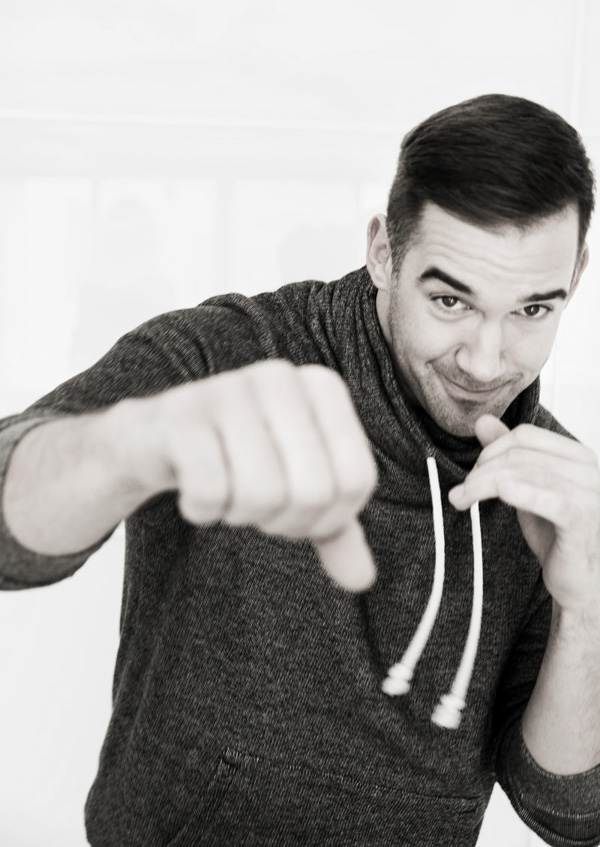
Kristen: Thank you for courageously coming forward and talking about that and using the word ‘rape’. You and I spoke off camera because I found it difficult to bring that word into the interview when I was doing my research and writing the notes. As a mama and as a human being, I really applaud you for going back and revealing that — for creating a safe space for other people to come forward with their wounding. This is really something we have to look at collectively as a society. Creating the space where boys are taught that it’s okay and it’s safe to be vulnerable and to share emotions about their experiences.
Lewis: Exactly.
I was probably the most sensitive kid. I was always crying growing up. I was always sensitive, I was always afraid, hurting myself, and calling out for my mom all the time. At some point, I was told that’s not okay. I was told that’s not manly enough and people didn’t want to be around me if I was sensitive. I remember having guy friends on the sports teams and I would just want to put my arm around them and they’d be like, “Get off me, you’re a fag.”
Kristen: The messages were conflicting: show emotion, get shut down.
Lewis: It became unacceptable to show that you cared about your friends. So I had to toughen up just to be accepted. Look, we all want to fit in. We all want to belong somewhere. If my classmates or my teammates in school don’t think that I fit in, or don’t make me belong, then I started to put on masks to say, “Okay, I’ll do whatever it takes for you to accept me.” Otherwise, I’m just going to be isolated my whole childhood and not have any friends. I think early on I was putting on masks to feel like I fit, to feel like I belonged to something. And it worked. I got those relationships. I got friendships, but I always felt something was missing inside.
Kristen: Unfulfilled on a certain level because you were building something on false pretenses.
Lewis: Yes, of course.
Kristen: I know what you have accomplished in your professional life. It’s very admirable. You are an UBER goal setter and you have an amazing capacity to point your target somewhere, go for it, and achieve it. I don’t want to disregard that as a great quality, provided…
Lewis: …the intention is pure.
Kristen: Right.
It’s interesting that Oprah recently said, “What I know for sure is that speaking your truth is the most powerful tool we all have.”
Lewis: That was powerful.
Kristen: I was also thinking as I was reading your book about how crazy the timing is; how so much is converging simultaneously with all of the movements like #TimesUp and #MeToo. With all the outing of sexual abuse by men in power in Hollywood and in politics, it is an idea whose time has finally come.
Lewis: The challenge is, as wrong as these men are, and with all the events that are unfolding, the common denominator is men in all of these instances. And we want to get to the bottom of why.
A friend of mine just came out yesterday in a People magazine interview talking about how in his first movie, he was sexually abused over and over by the director of the film when he was 21 years old. He’s lived with this guilt and shame for the last 24 years feeling wrong about himself, and is finally starting to talk about it, allowing himself to let it go. These stories aren’t being talked about because there’s so much emphasis on all the wrongdoing of men, which is justified, but there are also men who are hurting who have gone through similar experiences.
Kristen: So the beauty of that is it’s cracking open a broader conversation. It doesn’t have to be gender specific. Emotions aren’t gender specific and neither is abuse, right?
Lewis: Right.
Kristen: As you point out, we really have to start looking at the power of language and the power of the terminology that we’ve been using. We need to look at the things that we may have been told or heard or downloaded as a kid. Things like: ‘man up’, ‘get over it’, ‘be a man’, ‘don’t be a wuss’. And on the flip side, we need to recognize when we routinely make justifications by saying things like, ‘boys will be boys’, chalking it up to biology or testosterone.
In the book you said, “I’m a boy from Ohio. It’s a factory, farming, football, meat-and-potatoes kind of place. The way I was taught to deal with my problems was to smash into things as hard as I could on the football field, maybe in the parking lot, too, if necessary.” You spent a lot of time smashing into things.
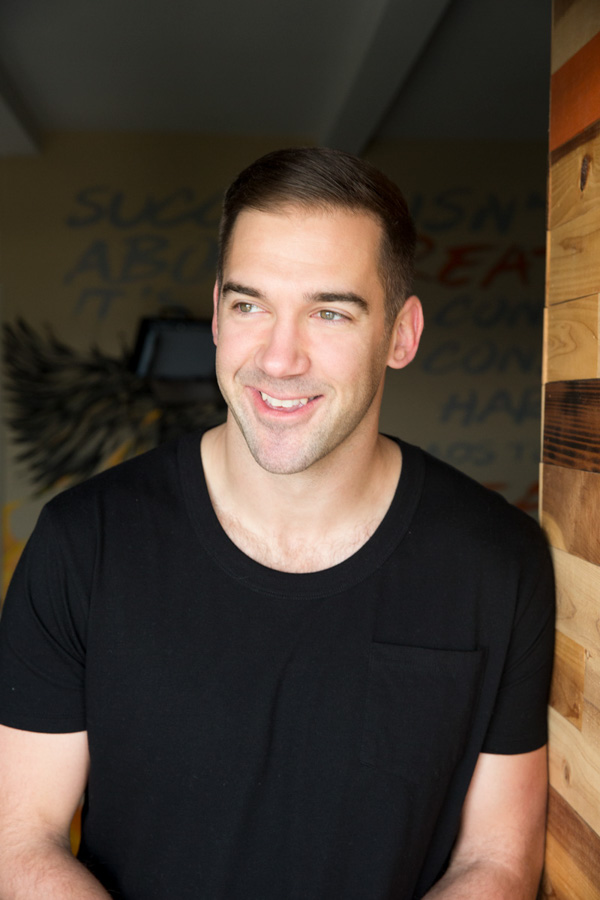
Lewis: Absolutely. Every day practicing football, basketball, whatever, I was always hitting something. That was an outlet for me to express myself because I wasn’t allowed to be affectionate. I wasn’t allowed to communicate in ways that were expressive. I wasn’t allowed to look someone in the eyes and just have a conversation. For me it was like, okay, all the things that I want to say and do, now I can let it out on the football field because it’s a safe space to do that. It was a container that I could do this in every single day to release this aggression.
The true challenge is when that container is no longer there, when there are no more sports, no more football, no more practice, no more games, then how do I release it? What do I do? For a decade this anger, resentment and passive aggressiveness would come out in other ways (and not good ones.)
I didn’t know how to let it go so I thought, okay, I’ll go work out. Then if I wasn’t working out it was like, well, I just need to yell, or I needed to punch something, or ahhh, I don’t know how to express myself so what do I do? It’s not okay to be vulnerable, so I need to express myself with the opposite of that which is not a healthy way to live life.
I was never able to sleep at night until about four years ago. I would go to bed and then lay there for at least an hour. It didn’t matter what time it was, I would just lay there. I never understood why I couldn’t go to sleep.
I would try different things, but nothing would work. I had friends that would just hit the bed and pass out. I was like, how do you do that? They’d say, “Yeah, I can sleep anywhere. On a plane if I close my eyes I go to sleep.” How? Then I realized I was just living with such anxiety and I had a total void of inner peace 24/7. I was always in stress mode, always anxious. Once I was able to find inner peace I was able to sleep at night. About four years ago I was able to start falling asleep within minutes.
Kristen: So let’s just stop there for a second. What was the thing that cracked you open? Was it a book? Was it a therapist? What made you recognize that you needed to find this inner peace?
Lewis: It was a perfect storm of events. Unfortunately, I think more commonly than not, it takes a major catalyst in our life, especially if we’re someone that wears a lot of masks, to finally say, “I’m going to look within and be aware of this and start to make some changes.”
For me, I had three events that happened around the same time. One was with a girlfriend. We had a very toxic breakup where I didn’t know how to communicate and express myself. I would take my anger and frustration out on the basketball court or in the gym. I wanted to take it out on her, but I didn’t have the emotional courage to communicate how I was feeling. I just people-pleased and beat myself up.
I also had a business partnership, a relationship where our vision started to go in opposite ways and again, I didn’t know how to communicate what I really wanted. Since I wasn’t getting what I wanted, I was just disconnected and short with him. It escalated into arguments, and not a happy ending to our partnership.
I took this anger to the basketball court as well. Almost every time I would go play basketball I would pick a fight. I would argue. I would talk back. I was literally looking for someone who wanted to fight me. I was instigating it because I didn’t know how else to get those emotions out. At one of these games a guy ended up head butting me, which gave me the okay to hit him back. We got in a brawl on the basketball court where everything I had been carrying bubbled up. I remember at the end of this fight I looked at him and I could barely recognize his face. I started to shake.
The police department was right across the street from this outdoor court. I remember it all hit me in that moment as I was thinking, “I’m 30 years old and I just did this. Everything has been going well for me and yet I could lose everything.” I remember running back to my place here, looking in the mirror, shaking, and trembling.
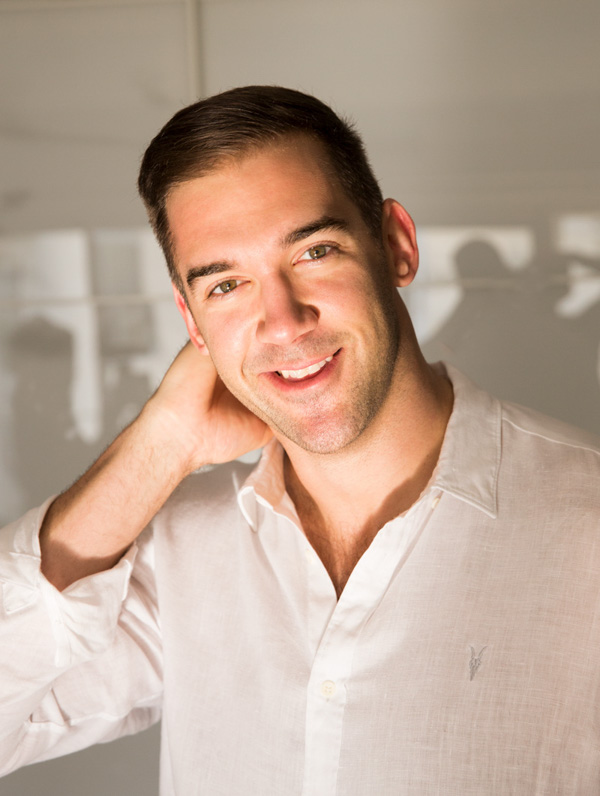
Kristen: Like an out-of-body experience.
Lewis: Yes, I was just looking at myself thinking, “Who are you? What are you doing? Why did you do this? Why are you reacting this way all the time?” It finally hit me that, in reality, everything and nothing was going well in my life.
Kristen: What’s the common denominator here?
Lewis: Exactly. Why am I constantly this way? Why am I reacting? Why am I angry? What is it? I didn’t know what it was. I started getting support from some friends. I was going to therapists and talking to them. I was reading books and I was going to different workshops. I thought, I’ll try anything. But my ego was still in the way for a while. I started telling myself that maybe this is just who I am and people aren’t going to understand me because I’m probably not going to understand myself.
Kristen: So don’t play basketball with me.
Lewis: I actually stopped playing for a while.
But one of the workshops I attended really got me to dive in deep emotionally. It was an emotional intelligence workshop with a lot of people opening up about their past and things that were going on.
Kristen: There’s the key phrase, ‘opening up’.
Lewis: Everyone was opening up.
Kristen: Being vulnerable in that safe container.
Lewis: That’s it. I had a container. I had context. People were opening up and sharing things, which made it safer for me to feel like, “Uh, maybe I can share something as well.”
Kristen: …and maybe I’m not the only one?
Lewis: It was a five-day workshop and on day three, the facilitator said, “Okay, we’ve talked about things from our past. We talked about parents and relationships of the past, and everything else from your past with everyone. Now we’re moving forward. We’re getting clear on your vision for what you want in your life.”
It was a ‘best self’ type of experience. “What is the life you want to live, moving forward? It’s hard to live that life unless we address things that have been holding us back. So, if there’s anything that you guys haven’t shared that you need to share, if there’s anything you’ve been holding back, now is the time.” It was one of those ‘forever hold your peace’ type of a moments.
In my mind, I’m going through it, feeling like I checked it all off my list. I talked about my parents going through divorce, and being the youngest child and feeling neglected. I talked about my brother, who went to prison for 4 1/2 years, and me not having any friends during that time because none of the neighborhood kids’ parents would allow their kids to hang out with me during that time. They thought I was going to be bad, too. I talked about being picked on, feeling insecure in school.
I talked about all these things and then that moment emerged: What about that time I was raped and sexually abused? How come I’ve never talked about this? Why have I never opened up about this? What have I been holding onto? What is this shame and guilt that I’ve been holding onto?
I thought, I need to say this NOW, otherwise I’ll probably never talk about again it in my life. I was 30 years old at that time. I just stood up and walked in front of the room and told the whole story — like I was in the moment, and just reenacted the whole story, staring at the ground the entire time.
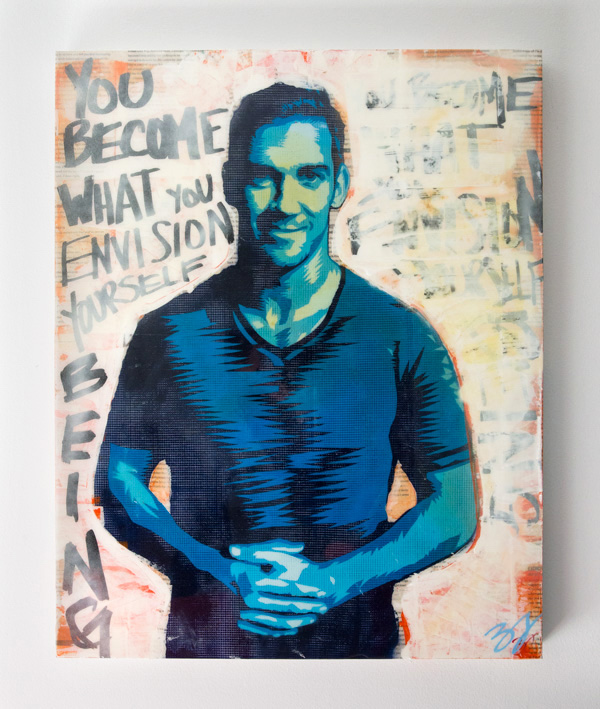
Kristen: Bravo.
Lewis: And then I sat down afterwards. I remember during that moment I couldn’t look anyone in the eyes. I sat down and erupted in tears. I just bawled, and bawled, and bawled.
I remember there were two women on each side of me who were hugging me and they were crying. I was just kind of ashamed and embarrassed, so I ran out of the room and just got some fresh air outside of this conference room. And what unfolded next was truly one of the most beautiful experiences of my life.
Within a few minutes all the men from that room came up to me outside and gave me a huge hug, looked me in the eye, and said I was their hero. They told me, “You’re so courageous. I’ve held onto this secret that I’ve never told anyone. I was sexually abused when I was young and I haven’t said it to anyone.” I was like, what? That’s when I realized that so many other men have gone through some type of shame or insecurity — whether it be sexual abuse or something else that they’re ashamed of that they’ve never told people.
I realized, okay, so the thing that I was most afraid of talking about is the thing that has connected me on a deeper level to the other people in the group. My biggest fear of having people know about me, the thing I was ferociously hiding, is actually my greatest strength.
People were suddenly asking what they could do for me, how they could support me in getting my message out. It was crazy. They all said, “You’ve got to share this with your family.” I was like, “No, way. This is a safe space in this workshop.”
Kristen: So your family didn’t know?
Lewis: No one knew. Not girlfriends, family, no one knew. After this workshop I started sharing one by one with my family. And that was terrifying because I was raped by the babysitter’s son.
Kristen: So at 5 years old you never told anyone?
Lewis: Never told anyone. I was terrified.
Kristen: Were you told not to tell anyone?
Lewis: No. I guess I had an innate feeling that no one can know about this.
Kristen: If I don’t talk about it, maybe it will go away.
Lewis: I just don’t think I had the emotional capacity to be like, “Oh, I should go tell my mom that this happened.” I don’t know. There was no real conversation with my parents, or at school, or class — no conversation directing us that if this happens, if someone does this… here’s what you do. There was no education around this.
It wasn’t until I was somewhere between 11-13 years old when I realized how messed up it actually was; but I remained silent. I always had the vision of that day in my mind. Even right now I can remember exactly what happened. It was kind of like a bad dream that would continuously reoccur, every few days, just a flash.
Kristen: And you wonder why you weren’t sleeping.
Lewis: Exactly. There was just no context to share with anyone. I didn’t know how to.
Kristen: As you say in the book, men don’t have the vocabulary to talk to each other.
Lewis: Growing up, we’re conditioned by our environments and our experiences and the people we surround ourselves with. I was very conflicted. My parents encouraged me to express myself, but then at school my friends said it wasn’t okay.
Kristen: Express yourself, but not that much.
Lewis: So many mixed messages. If you wanted to put your hand on a guy’s shoulder or give him a hug, the message received was always, “get off me.”
Kristen: Your natural inclination is that of a hugger.
Lewis: Absolutely.
People would respond, “What are you gay? Are you a fag?” So I was like, whoa, is that bad? This is something that’s happened to me by a man, so am I wrong for that? Even my friends were saying, “Don’t do this, don’t touch me.” Whatever. Why would I ever tell anyone what happened to me if just putting my hand on someone makes me wrong as a friend?
Kristen: So that’s an early download for you that made it absolutely unsafe for you to express yourself.
Lewis: Absolutely. I just decided that I was going to become as big and strong as possible so that no one could ever hurt me and that I could always defend myself in any situation. That became my vocabulary. I was determined to defend myself at all costs — physically, emotionally, mentally. If anyone tried to verbally attack me I would defend myself, and never let anyone hurt me or attack me ever again.
It ultimately became an issue online. Once I started to build my business, people would send nasty tweets about me, or critique me, or whatever. Then I would have a raging text conversation with them on Twitter to defend myself. It never did me any good. Those reactions never supported my best self and the vision for my life, and it didn’t bring me inner peace — it perpetuated chaos. Every day I was just trying to defend myself all the time and it left me with a sense of anxiety because I always wanted to get back at them and find a way to make them wrong. It wasn’t until about four years ago when I realized, Wow, this has just been hurting me my entire life and I can’t live this way anymore.
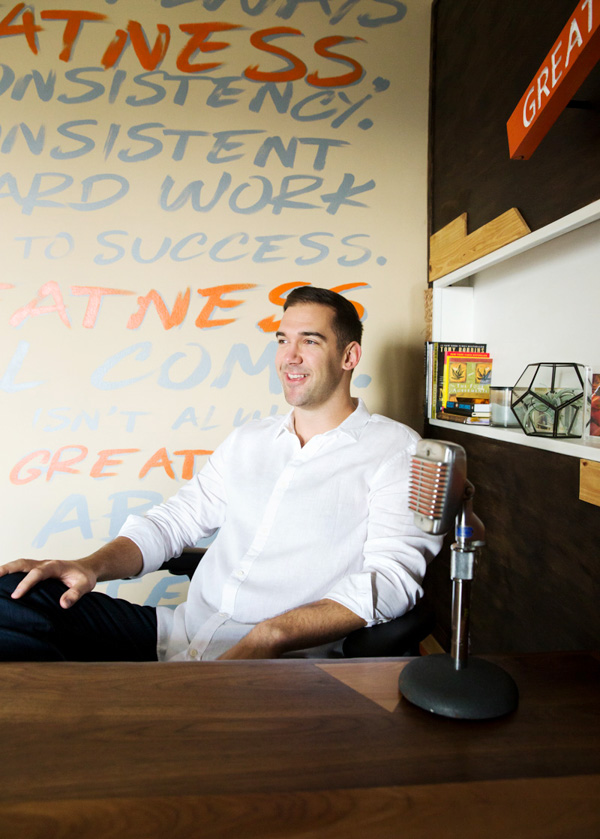
Kristen: It’s like redefining what it is to ‘win’.
Lewis: Absolutely. I realized that it doesn’t matter if I win alone anymore. Being the winner on an island by myself is very lonely and isolating. I decided that in anything I do, everyone else must win around me. Otherwise, it’s not a win for me. How can I win? How can the people around me, and the world win?
Kristen: Before that you had really been building a moat around yourself, making yourself quite untouchable. Getting to this wonderful notion of the masks that we wear, you say something about how they can also become fused to our faces. We often lose sight of where the man starts and the mask ends and how we peel them off.
You said in the book: “Remember those boxes we stuffed our emotions into when we were younger? As we outgrew the boxes, they transformed into masks that hold us back and hurt our friends, family, career partners, and intimate lovers.”
When did you get this? When did this begin to make sense in your own life and when did you start to connect to this metaphor that these suppressed wounds and emotions are being hidden behind masks?
Lewis: I don’t know. I think in terms of marketing and packaging ideas. I realized that I was never fully showing my true self. I was always hiding behind something else to prove a point, to fit in. I was like, Man, I’ve just been hiding behind this armor. Throughout my whole life I’ve worn these different types of masks, these portrayals of what I wanted people to accept me as in order to fit in.
Early on it was sports. I was wearing the Athlete mask. That’s what gave me self-worth. When I achieved results, when I won, when I got picked first — that gave me self-worth. That Athlete mask was my identity to bring more self-worth in my life. When that ended and I started building my business, I thought, Hmmm, I have no more identity. No one accepts me as an athlete anymore because I can’t perform on the field.
Kristen: I gotta get me a new mask!
Lewis: So what’s the thing that’s going to make me accepted in the next phase of my life? Lots of money. Let me put on the Material mask and show people how much I can make, and how successful I am at business. My net worth became directly correlated to my self-worth. The more money I made, the more it fed my self-worth. If anything went wrong in business, it was like an attack on my self-worth. One of the reasons that the business partnership I mentioned earlier didn’t work out was because I felt like anything he was doing which hurt our business was an attack on me and my self-worth.
Kristen: Everything was personal.
Lewis: Everything was personal. The Sexual mask was the phase of my life where I wanted to conquer every woman that I met.
Kristen: I want to make sure everybody knows how you divided this book up. You discuss this notion of there being 9 dominant masks: the Stoic mask, the Athletic mask, the Material mask, the Sexual mask, the Aggressive mask, the Joker mask, the Invincible mask, the Know-It-All mask, and the Alpha mask.
What’s wonderful about the way you’ve organized this is that you take us through the definition of what each mask is, and then you give some tangible, practical tools for the mask wearer. Hey, try this and if you can free yourself from this mask — this is what you can avail yourself of. Also, I totally love the part regarding women. Can you talk about this for a moment?
Lewis: As I was doing research and interviewing a lot of psychologists, who were actually the real experts, I realized that I wanted to give men more actionable steps. I wanted to provide some simple things they could to start taking off the mask, to see what’s available on the other side. I also began to understand the real power of relationships.
We have women who have fathers, husbands, boyfriends, sons, brothers, uncles, who all feel disconnected in some way, or something’s not working in those relationships. The real power comes from women when they can connect to the men in their life that they’ve been disconnected from. And to finally mend those relationships by not making men wrong, or telling them they need to change, but by shifting the energy so slightly, and instead being able to resonate and connect with the man who might be wearing a mask.
If you can see that the man in your life is always coming from the Joker mask, if he’s always making a joke and everything’s got to be funny, he can never be serious for a moment. If in any vulnerable situation he tells a joke, there’s something beneath that. There’s nothing wrong with being funny some of the time, but if he can never go into a normal, vulnerable, or serious moment, then something’s beneath that. There’s some type of wound.
When you can understand what that is, then you can speak to the heart of the matter and connect, and resonate in a way that perhaps he’s never felt. When he can feel a little bit safer, then maybe he doesn’t need to tell a joke every ten seconds and instead can just look you in the eyes and have an intimate conversation. That’s progress.
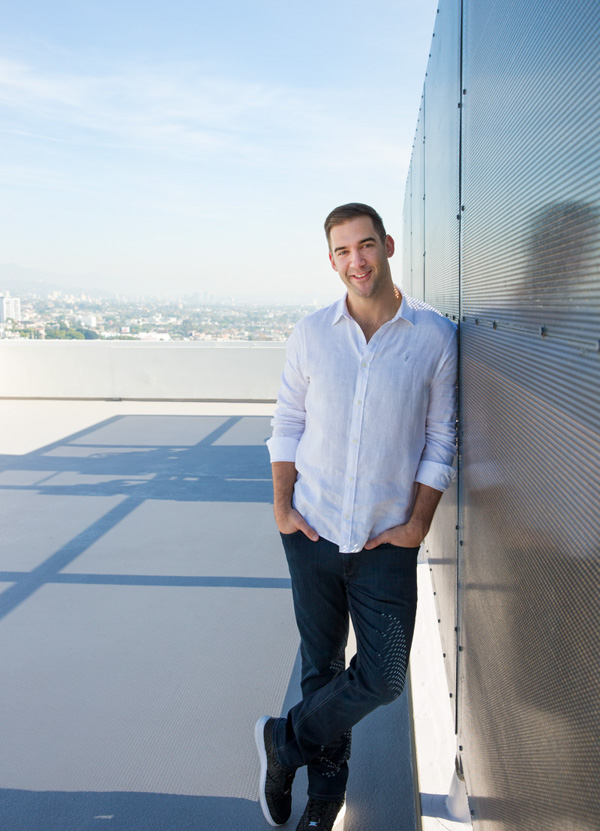
Kristen: It’s like being in that space where you were able to tell the truth about the rape.
Lewis: Absolutely. It’s creating context in that environment and in that relationship. That’s what I wanted to be able to help women do as well — to give them some practical things they can try.
Kristen: Let’s also be clear, it’s not about putting up with anybody’s crap.
Lewis: No, it’s not about allowing someone to walk all over you or accepting unacceptable behavior.
Kristen: It’s about loving someone and saying, okay, I’m going to support you through this because there’s wounding underneath this behavior. I want to be a part of the healing.
Lewis: Absolutely. Right.
Kristen: It’s really just about a shift in the semantics for all.
Lewis: Yes, a shift in the conversation.
Kristen: So let’s go back again to the masks. What are yours?
Lewis: I’m wearing all of them. I’ve worn them all and I wear them all still, at different stages or different times of the day. I’m much more aware of them when they happen or I’ll recognize it through something with my team, or my family, or my girlfriend. Suddenly I’ll catch myself and recognize, “Oh, okay, I’m wearing a mask right now.”
Kristen: But now you have the tools.
Lewis: I’m so much more aware of that now that I can shift out of it, or I can own up to it, or I can apologize and take responsibility for it and move forward. It’s a constant, daily practice for me. They say that people write about the things they need the most for themselves.
Kristen: That’s what Best Self is all about. It’s my on-the-job-training and personal therapy. [laughing]
Lewis: For me, it’s a daily reminder. I think I’ve been conditioned for 30 years of my life to be a certain way. It takes time to fully un-condition that and re-condition to something else. I’m constantly trying to be intentional. When I wake up I’ll meditate and visualize the version of myself I want to be that day. I go through all the situations in my day that could happen. For instance, if I’ll be driving to a meeting and someone cuts me off, do I want to respond with anger, trying to go in front of that person and flip them off and scream at them like I used to do all the time?
Kristen: Been there, done that.
Lewis: Been there, done that many times. I’ve almost gotten to the point where I got out of my car and got into a fight. I go through all these situations. If my team drops the ball do I want to scream and yell, or do I want to come from compassion, or love, or just a calm conversation? How do I want to respond if my girlfriend does something that upsets me, if something triggers me in any part of my life, how do I want to show up? What would my best self respond as?
I imagine and visualize creating that response before it actually happens. That practice for me every single day really allows me to let go of those masks in a better way. I still make mistakes. I’m a human, messing up all the time. But I’m constantly practicing and trying to be better.
Kristen: They don’t call it a ‘practice’ for nothing. These emotions, they can only be suppressed for so long then they’re going to come out…
Lewis: …some way.
Kristen: You said that the un-masking process takes time, and that you’ve also got to love yourself through that process. You carried that burden for such a long time, practically your whole life. It must have been the most enormous relief to get that out.
Lewis: Freedom. I never felt freedom in my life until then.
Kristen: There is also so much freedom in taking ownership of our actions by apologizing.
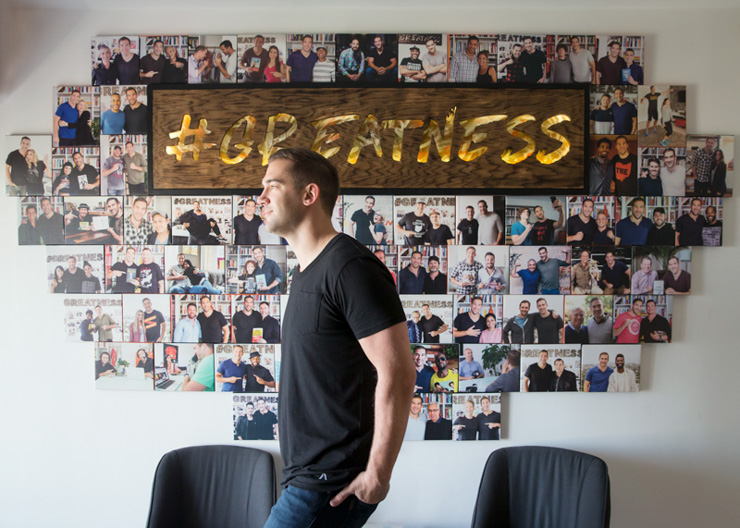
Lewis: It’s powerful when we’re aware.
The crazy thing is that when I started opening up about all the trauma and things that I went through, I realized that so many other men have gone through way more. They started emailing me and sending me essays of the things they experienced that honestly made mine look like a Disney movie. Now, I’m not trying to compare and say they have it worse, or whatever. I’m just saying there are so many people in the world who have had it much more challenging, who have had much less than me and have had harder experiences to go through. I’m also grateful for the things I do have and the experiences I did have, and I try to really reflect on the good all the time.
Even though my inner world was suffering from these experiences, there were still a lot of great things happening that I reflect on and I’m grateful for, and I use those moments of vulnerability as part of my story now. It’s a constant healing process, but it doesn’t own me anymore.
I think there are many men out there who aren’t willing to communicate about the things that have happened to them, even to a therapist, a counselor, their spouse, or to one friend. Look, it doesn’t have to be to the world. If you can’t share the things you’re most afraid of with at least one person in confidence — a priest, I don’t care who you talk about it to — then that situation has power over you still. And you’re unable to be fully free until those moments in your past don’t own you anymore.
Kristen: You want to get to that place of inner peace that you were talking about.
Lewis: That’s it. For me, I’ve realized that I had to examine the things in my life that still had power over me. I needed to talk about them, to address them to be able to have a conversation like this without stuttering, quivering, and sweating with my heart palpitating. When I first started talking about sexual abuse I would stutter; I was nervous and scared. Now I can talk about it calmly because that situation doesn’t have power over me anymore. That’s given me a lot more inner peace. And I’m no longer afraid of what someone thinks about me anymore because of this information.
Kristen: That’s huge, especially coming from the guy who spent the majority of his life proving other people wrong.
Lewis: Yes.
Kristen: We spoke earlier about your career playing professional football and how an injury can change the trajectory of your life. As you were sharing that story it immediately popped up in my head that you were meant to change course because you were meant to be here in this moment, sharing this story, and helping other men do the same. You were meant to be a part of shifting this conversation, part of this paradigm shift.
So how would you define what it is to be a ‘real man’ today?
Lewis: A man who lives in service — service to his dreams and service to the world. I think the best thing you can do is love yourself fully, and love your dreams. Without those dreams and the pursuit of those dreams you’re living a subpar life and you’re doing a disservice to those around you by not living your fullest life. In the midst of that pursuit of your dreams and that self-love — ask yourself: How can I give back and be of service to the most people around me? I think that’s a real man.
Kristen: What would you say now to that little boy, that little five-year old who tried to bear that enormous burden, who was teased, who didn’t think he was smart because other people told him he wasn’t? What would you tell him now?
Lewis: I would tell him it’s all going work out. To be patient. To be courageous. To talk to your parents about what you’re going through, to express yourself, and to not beat yourself up so much.
Every day I was beating myself up — telling myself that I wasn’t good enough, that I wasn’t smart enough. When I would get in trouble in school I would tell the Principal, “I wish I were dead. I wish I wasn’t here.” Now, I would tell that little boy that his life has a purpose and there is deep meaning for being here. I would scoop him up and just give him a hug.
Kristen: Oh, I wish I could give him a hug, too! I can’t help but be the mama here listening to you and thinking about how we all play a role in this, and how we all need to check in on our biases, and our conversations, and our terminology, and our words. The world is shifting, but imagine a place now where little girls can be fierce, and little boys can cry, and this can all change in schools. We have to do better.
I know it’s beginning, but imagine the new conversation that allows kids to have outlets when they are stressed. Imagine the tools, meditation, tapping (EFT emotional freedom technique), etc. Where would you like to see this evolve?
Lewis: If I would have had meditation, I think my life would have been transformed at an earlier age. I think it would be powerful to simply have open circle conversations with young boys and girls together talking about different issues in school. We never had that. Facilitating these kinds of forums for communication — without making people wrong or shaming anyone — could be so powerful. Everything was embarrassing growing up and it seemed like you were always being made fun of for something, but imagine the possibility of where it could go. I think it would be a beautiful thing.
Kristen: How would you handle it with your children?
Lewis: I think I would continuously be having conversation. Every night I would have a conversation, empowering them, encouraging them to express themselves at least with me. Ask them how they’re feeling. Ask them what’s going on. Also, being vulnerable and opening up to them. I think you can’t get people to open up unless you’re willing to do it first.
Maybe I would be saying, “This is what I’ve been going through today and I’ve been having a challenge with this or I was insecure about that.”
I’d provoke them to make their own connections. “Is there anything you felt today during class or with other friends that made you feel something similar or different?” I think I would need to set the example and not think I have all the answers. I’ve figured it all out. But instead, the goal would be to create a space for vulnerability and sharing.
Kristen: That is such a good point. The truth is that, at least when I was growing up, parents didn’t really lay their cards on the table and reveal their emotions in that way. So when we did witness something it was often frightening.
I think that we have to model.
Lewis: Absolutely.
Kristen: Thank you for writing this wonderful book, and for celebrating the voices of many men within its pages who not only share their stories, but have also helped you. This is how we crack open a new conversation and shed light on the things that need to come forth. This is how the un-masking begins.
Thank you for being on the forefront of that and being open-hearted enough to come forth with your story, and for sharing it, because again, it’s going to crack open a big hole and create a safe space for others to do the same.
Lewis: That’s it. I appreciate it. Thank you.
